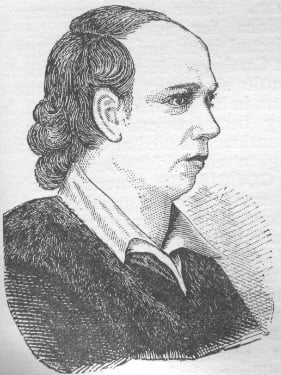Oliver Goldsmith
Oliver Goldsmith (November 10, 1730(?) – April 4, 1774) was an Irish writer and physician known for his novel The Vicar of Wakefield (1766), his pastoral poem The Deserted Village (1770) (written in memory of his brother), and his plays The Good-natur'd Man (1768) and She Stoops to Conquer (1771)and first performed in 1773. (He is also thought to have written the classic children's tale, The History of Little Goody Two Shoes, giving the world that familiar phrase.)
He was born in the townland of Pallas, near Ballymahon, County Longford, where his father was Anglican curate of the parish of Forgney. When he was aged two, his father was appointed rector of the parish of Kilkenny West in County Westmeath. The family moved to the parsonage at Lissoy, between Athlone and Ballymahon, and continued to live there until his father's death in 1747.
Goldsmith earned his Bachelor of Arts in 1749 at Trinity College, Dublin, studying theology and law but never getting as far as ordination. Nevertheless, his name has been given to a new lecture theatre and student accommodation on the Trinity College campus, Goldsmith Hall. He later studied medicine at the University of Edinburgh and the University of Leiden, then toured Europe, living on his wits. On his return, he settled in London, where he worked as an apothecary's assistant. Perennially in debt and addicted to gambling, Goldsmith had a massive output as a hack writer for the publishers of London, but his few painstaking works earned him the company of Samuel Johnson, along with whom he was a founding member of "The Club". The combination of his literary work and his dissolute lifestyle led Horace Walpole to giving him the much quoted epithet of Inspired Idiot.
Goldsmith is recorded as being a highly jealous man, a likeable but disorganised character who once failed to emigrate to America because he missed the ferry.
He was buried in Temple Church; his death in 1774 may have been partly caused by his own misdiagnosis of his condition. There is a monument to him in Westminster Abbey with an epitaph written by Samuel Johnson.
Goldsmith's birth date is not known for certain. According to the Library of Congress authority file, he told a biographer that he was born on November 29, 1731 or perhaps 1730. Other sources have indicated November 10, on any year from 1727 to 1731. November 10, 1730 is now the most commonly accepted birth date, according to the Encyclopedia Britannica.
Notable works
- The Citizen of the World (1762)
- The Traveller (1764)
- The Vicar of Wakefield (1766)
ReferencesISBN links support NWE through referral fees
- The Vicar of Wakefield, ISBN 0-19-283940-3
- She Stoops to Conquer, ISBN 0-486-26867-5
- Life of Oliver Goldsmith, by Washington Irving, ISBN 1-58963-236-2
- The Complete Poetical Works of Oliver Goldsmith by Austin Dobson (Editor), ISBN 1-58827-277-X
- Oliver Goldsmith (Everyman's Poetry Series) edited by Gordon Campbell, ISBN 0-460-87827-1
- George Rousseau (1974), Goldsmith: The Critical Heritage (London: Routledge and Kegan Paul, 1974). ISBN 710077203 Template:Please check ISBN
External links
- Works by Oliver Goldsmith. Project Gutenberg
- The Deserted Village
- Oliver Goldsmith: A Biography by Washington Irving from Project Gutenberg
- Goldsmith (English Men of Letters series) by William Black from Project Gutenberg
- An Essay on the Theatre; or, A Comparison Between Laughing and Sentimental Comedy
- Goldsmith Hall - student accommodation and lecture theatre, Trinity College, Dublin.
- Information on Goldsmith
- Oliver Goldsmith Resource
Credits
New World Encyclopedia writers and editors rewrote and completed the Wikipedia article in accordance with New World Encyclopedia standards. This article abides by terms of the Creative Commons CC-by-sa 3.0 License (CC-by-sa), which may be used and disseminated with proper attribution. Credit is due under the terms of this license that can reference both the New World Encyclopedia contributors and the selfless volunteer contributors of the Wikimedia Foundation. To cite this article click here for a list of acceptable citing formats.The history of earlier contributions by wikipedians is accessible to researchers here:
The history of this article since it was imported to New World Encyclopedia:
Note: Some restrictions may apply to use of individual images which are separately licensed.


